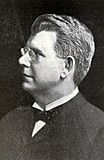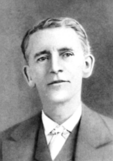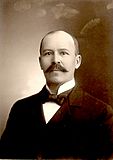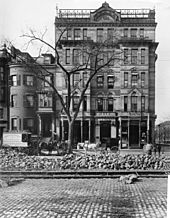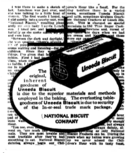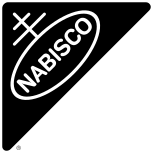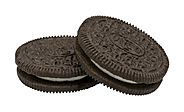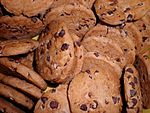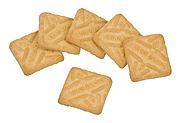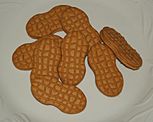Nabisco facts for kids
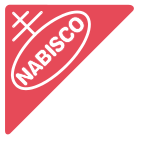 |
|
|
Formerly
|
|
|---|---|
| Subsidiary | |
| Industry | Food |
| Predecessor |
|
| Founded | June 19, 1898 Chicago, Illinois |
| Founders |
|
| Headquarters |
,
United States
|
| Products | Cookies, crackers, candy, chocolate |
| Brands |
|
| Parent |
|
Nabisco is a famous American company that makes cookies and snacks. The name is short for its original name, the National Biscuit Company. You've probably eaten some of their snacks, like Oreo cookies, Chips Ahoy!, and Ritz Crackers. The company is headquartered in East Hanover, New Jersey, and is owned by a larger food company called Mondelēz International.
Nabisco has a huge bakery in Chicago, which is the largest in the world. This single bakery employs over 1,200 people and makes about 320 million pounds of snacks every year! Nabisco's snacks are sold in the United States, Mexico, the United Kingdom, and many other countries.
In Canada, Nabisco's products are sold under the brand name Christie. This is named after a Canadian baker named William Mellis Christie.
Contents
The Story of Nabisco
Nabisco's history began a very long time ago. One of the bakeries that later became part of Nabisco, called Pearson & Sons Bakery, opened in 1792. It made a type of hard biscuit called pilot bread that was perfect for long trips on ships.
In the late 1800s, many small bakeries were competing with each other. A man named William H. Moore bought several bakeries in 1889 and formed the New York Biscuit Company. Around the same time, a lawyer named Adolphus Green started the American Biscuit and Manufacturing Company by bringing together 40 different bakeries.
In 1898, Moore and Green decided to join their companies. Along with another baker named John G. Zeller, they merged to create the "National Biscuit Company." This new, large company had its main office in Chicago in the world's first skyscraper, the Home Insurance Building.
Becoming Nabisco
The company first used the name "Nabisco" for a new cracker brand in 1901. Over the years, the company created many snacks that are still popular today.
- Barnum's Animal Crackers (1902)
- Lorna Doones (1912)
- Oreos (1912)
- Famous Chocolate Wafers (1924)
The name Nabisco became so well-known that the company officially changed its name from the National Biscuit Company to Nabisco in 1971.
In the 1920s, Nabisco had a clever idea. They started selling snacks in small, sealed packets. This made it easy for places like soda fountains, newsstands, and lunch counters to sell their products. These snacks were called "Nabs," and even today, some people in the southern United States use the word "nabs" to refer to any kind of snack cracker.
Big Changes and New Owners
Over the years, Nabisco was involved in many mergers, which is when companies join together.
- In 1981, Nabisco merged with Standard Brands to become "Nabisco Brands."
- In 1985, it merged with the R. J. Reynolds Tobacco Company to form RJR Nabisco.
- In 2000, Nabisco was bought by Philip Morris Companies Inc. and became part of Kraft Foods.
- In 2011, Kraft Foods split into two companies. Nabisco went with the snack food part, which was named Mondelēz International, its current owner.
How Nabisco Grew
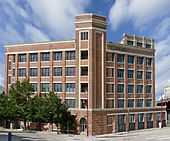
The National Biscuit Company grew by buying other successful companies. This is called an acquisition.
In 1928, it bought the Shredded Wheat Company, which made Triscuit crackers and Shredded Wheat cereal. In the same year, it also bought Christie, Brown & Company of Canada. This is why Nabisco products in Canada have the Christie brand name.
In 1931, Nabisco acquired the F.H. Bennett Company, the maker of Milk-Bone dog biscuits. The company later sold the Milk-Bone brand in 2006.
Through a merger in 1981, Nabisco also added popular brands like Planters Nuts, Baby Ruth, and Butterfinger candy bars to its family of products. It later sold the Baby Ruth and Butterfinger brands to Nestlé.
Nabisco's Famous Logo
Nabisco's logo is a red triangle with a white oval shape on top. It has two lines sticking out of the top, which look a bit like an antenna. This symbol is officially called the "Orb and Cross." You can see it on every box of Nabisco snacks and even stamped onto Oreo cookies.
The symbol has a very old history. It comes from a mark used by printers in Venice, Italy, hundreds of years ago. It was meant to represent the triumph of good things (the spiritual) over bad things (the material). The modern version of the logo was created by designer Gerard Huerta, who also designed the famous logo for the rock band AC/DC.
Popular Nabisco Snacks
Nabisco makes some of the world's most recognized snacks. Here are just a few of them:
- Belvita Breakfast Biscuits
- Better Cheddars
- Cheese Nips
- Chips Ahoy!
- Honey Maid Graham Crackers
- In A Biskit
- Lorna Doone
- Fig Newtons
- Nilla Wafers
- Nutter Butter
- Oreo
- Premium Saltines
- Ritz Crackers
- Teddy Grahams
- Triscuit
- Wheat Thins
- Zu Zu Ginger Snaps
Images for kids
See also
 In Spanish: Nabisco para niños
In Spanish: Nabisco para niños


